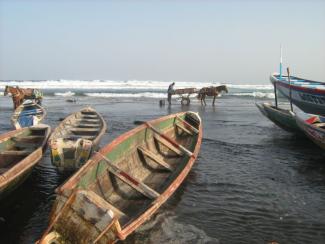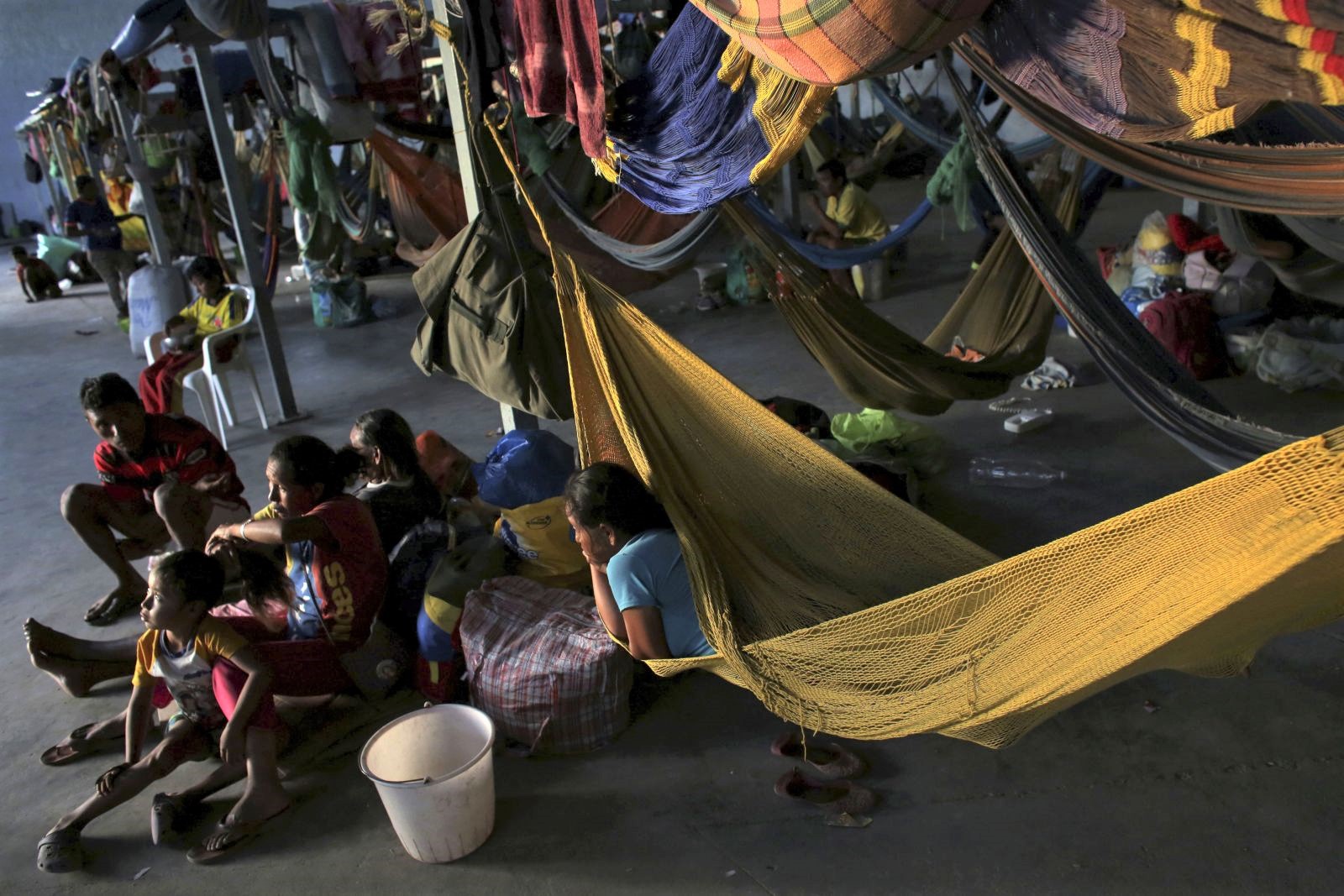Coastal communities
Fish species are disappearing

Both industries depend on resources – fossil resources and biological resources respectively. The oil companies have a habit of naming some of their offshore fields after fish species. For example, Shell operates the Bonga Field. Bonga is a regional fish. Otherwise, the two industries do not have much in common.
As the saying goes, however, the grass suffers when two elephants fight. Indeed, the multinational giants that are involved in the two industries before the West African coast care little for the natural environment. Oil corporations and industrial-scale fishing companies are causing serious damage.
The big fish trawlers are mostly from Asia and Europe, and they are depleting West African fish stocks. Some of their business is actually illegal, but it normally goes unpunished. The price of fish is going up, not least because ever more fish is bought by processing plants in Senegal and Mauretania, for example, where fish is turned into animal feed that is sold to industry-scale farms in the supposedly “advanced” nations of Asia and Europe. In the past, trawlers from Japan and the EU mattered most, but more recently Chinese and Russian ships have become relevant too.
Millions of West Africans are employed in fishing. According to the UN Food and Agriculture Organisation (FAO, 2014), marine artisanal fishing is a major contributor to gross domestic product in Ghana, Mauritania, São Tomé and Príncipe, Senegal, Sierra Leone, Togo and other countries.
Most people in the region depend on fish and marine foods for their protein consumption. Accordingly, the coastal fisheries do not matter only to the fishing communities. People’s food supply is at stake. The International Union for Nature Conservation (IUCN, 2017) warns: “Marine resources form the foundation for food security and livelihoods for the nearly 400 million people in western and central African countries with a marine coastline.”
Some fish species are disappearing from West African waters. According to the IUCN, threatened species include the Madeiran sardine (Sardinella maderensis) and the cassava croaker (Pseudotolithus senegalensis). Illegal fishing and overfishing imperil national and regional management efforts, the authors warn, and in many countries illegal catches are said to represent over 40 % of the reported legal catch. Not all illegal fishing is done by foreign trawlers, but without them, the situation would be much better.
The fish resources must be managed competently. So far, this is not happening. Unfortunately, moreover, fossil-fuel extraction is making matters worse.
Impacts of fossil fuel extraction
One reason is that oil rigs are treated as security zones. They are off limits to fishing boats, even though their bright lights attract fish. Indeed, the installations of the oil industries normally become hubs of marine life. Complex FPSOs – high-tech floating production, storage and offloading vessels – do so too. In other world regions, fisher folk are allowed to work in the areas concerned. In West Africa, they are not.
On the other hand, the fossil-fuel sector harms ecosystem. Oil spills have a devastating impact on fisheries, not only along the shore, but in estuaries and further upstream as well. Environmental destruction affects mangrove forests and coral reefs, which both are important spawning grounds and habitats of marine life. Increased ship traffic, moreover, means more pollution, and ever more vessels are going up the rivers.
Nigeria has a long history of horrendous oil spills. In 2011, Shell spilled 40,000 barrels of crude oil from its Bonga platform. In the same year, Chevron’s gas rig blew up and the fire raged for one month. In 1998, Mobil spilled 40,000 barrels from its Idoho platform. The greatest disaster was caused by Shell in 1979, when Forcados, an offshore terminal, lost 570,000 barrels.
The governments of other countries, where the oil industry is beginning to operate, promise they will avoid the kind of accidents that have haunted the Niger Delta. That is easier said than done, however. The case of Ghana is certainly not encouraging. This country recorded three offshore oil spills before the first shipment of crude was even made.
So far, there are no definitive studies that would document the full impact of oil spills on West African fisheries. However, we know that, almost three decades after the Exxon Valdez oil spill, the Alaskan fisheries have still not fully recovered.
The oil corporations deny that seismic petroleum exploration has impacts on marine ecosystems. Environmentalists have noted, however, that such activities do cause damage. For example, incidents of dead whales washing onto Ghanaian shores have been linked to them.
It matters, moreover, that the oil sector is not labour-intensive so it does not employ masses of people. The reasons are that oil production is highly automated and the processing of the commodity is not done in Africa, but in other continents. As a consequence, the oil business only benefits rather few African people.
African policymakers tend to be excited about the money oil exploitation can generate, but they mostly show little concern for the needs of poor rural people, including artisanal fishing communities. This attitude is unhealthy. The economic interests of rich nations are compounding the problems. The truth is that rural people deserve attention – and their livelihoods must be promoted, not endangered. African governments must ensure that development serves all of their people. And they must protect their nations’ natural environment form uncontrolled international exploitation.
Nnimmo Bassey directs the Health of Mother Earth Foundation (HOMEF), a non-governmental Nigerian ecology think tank.
nnimmo@homef.org
http://www.homef.org/
Links
IUCN, 2017: Overfishing threatens food security off Africa’s western and central coast as many fish species in the region face extinction.
https://www.iucn.org/news/overfishing-threatens-food-security-africa’s-western-and-central-coast-many-fish-species-region
FAO, 2014: The value of African fisheries
http://www.fao.org/3/a-i3917e.pdf













